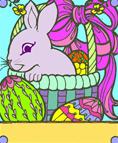|
Từ điển Oxford Advanced Learner 8th
Easter

Easter [Easter Easters] BrE [ˈiːstə(r)] NAmE [ˈiːstər] noun
1. uncountable, countable (also ˌEaster ˈDay, ˌEaster ˈSunday)(in the Christian religion) a Sunday in March or April when Christians remember the death of Christ and his return to life
•Easter services
2. (also East·er·time)the period that includes Easter Day and the days close to it
•the Easter holidays/vacation
See also: ↑Easter Day ▪ ↑Eastertime
Word Origin:
Old English ēastre; of Germanic origin and related to German Ostern and ↑east; perhaps from Ēastre, the name of a goddess associated with spring.
Culture:
Easter
Easter is a holiday in late March or early April, the first Sunday after the first full moon after 21 March. Many people spend it with their family or have a short holiday/vacation. It is also an important Christian festival. Easter Sunday, the day of the Resurrection, is the end of ↑Lent and the most important date in the Christian year. Many people who do not go to church at other times go on Easter Sunday. It was once common for people to wear new clothes to church on this day. Women wore new hats, called Easter bonnets. Today, people sometimes make elaborately decorated Easter bonnets for fun. A few people send Easter cards with religious symbols on them or pictures of small chickens, lambs, rabbits and spring flowers, all traditionally associated with Easter.
The Friday before Easter Sunday is called ↑Good Friday and is remembered as the day Christ was crucified (= hanged on a cross to die). On Good Friday many people eat hot cross buns (= fruit buns decorated with a simple cross). The Monday after Easter is called Easter Monday. In Britain, Good Friday and Easter Monday are both ↑bank holidays. In the US, each company decides for itself whether to close or remain open on those days.
Children look forward to Easter Sunday because they are given chocolate Easter eggs. These are also popular with adults and millions are sold in the weeks before Easter. Many are packed in coloured foil in brightly-coloured boxes decorated with pictures of cartoon characters. Others are decorated with sugar flowers and wrapped in clear paper tied with a ribbon. Some shops write the person’s name on the egg with icing (AmE frosting). Inside each egg are sweets or chocolates. Smaller eggs with a sweet cream inside are also popular. Eggs represent new life and the start of spring, and children sometimes colour the shells of real eggs at home. In some parts of Britain Easter is a time for traditional events such as ↑egg-rolling.
When American children wake up on Easter morning, they hope that the Easter Bunny has been. The Easter Bunny is an imaginary rabbit, and parents tell their children that it goes from house to house while they are sleeping. The Easter Bunny brings an Easter basket with chocolate eggs and other sweet things, or hides in the house small plastic eggs filled with sweets or little presents. When they wake up all the children run about trying to find the eggs. The Easter Bunny also often brings chocolate in the shape of a rabbit. In Britain some families now organize an Easter egg hunt, and people buy chocolate rabbits as well as eggs.
Example Bank:
•Easter is early this year.
•Have a good Easter.
•I prefer to spend Easter at home.
•Many people attend an Easter service at their local church.
•Our next holiday is at Easter.
•The house opens to the public at Easter.
•The library is closed over Easter.
•We usually go away for Easter.
•the Easter story in the Bible
|
|
|
▼ Từ liên quan / Related words
Related search result for "easter"
|
|
